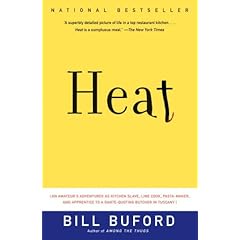
I'm scared of reviewing this book. I don't know why.
White Noise is the story of Jack Gladney, founder of the Hitler Studies undergraduate program at a small liberal arts college in a small town in America. He's married to his fourth wife, Babette, whom he loves, but desperately wishes to outlive. He also has four children, all to different mothers. The eldest son, Heinrich, plays chess by mail with a convicted killer in a nearby penitentiary. Heinrich is fourteen. He's losing his hair.
The Gladney family goes to the supermarket, watches television, listens to the radio, is consumed by the white noise, the waves and radiation, the patterns and codes of society. One day, the youngest daughter finds a strange bottle of pills that Babette is hiding behind a radiator. A man in a yellow Mylex suit dies in the elementary school. The television says: "Let's sit half lotus and think about our spines."
And then there's an accident. An airborne toxic event. A black chemical cloud, called Nyodene D, which causes skin irritation and sweaty palms, nausea, vomiting, shortness of breath, deja vu, miscarriages. And death. In rats, officially. But quite possibly in humans as well. And Jack Gladney is terrified of dying.
I think that's all I want to say about the story.
Reggie, this is my favorite book so far.
And if I may, I'd like to include a favorite passage from the book. If you're not interested, you may stop reading. But if you have a few more moments, why not? Ahem ahem:
The plane had lost power in all three engines, dropped from thirty-four thousand feet to twelve thousand feet. Something like four miles. When the steep glide began, people rose, fell, collided, swam in their seats. Then the serious screaming and moaning began. Almost immediately a voice from the flight deck was heard on the intercom: "We're falling out of the sky! We're going down! We're a silver gleaming death machine!" This outburst struck the passengers as an all but total breakdown of authority, competence and command presence and it brought on a round of fresh and desperate wailing.
Objects were rolling out of the galley, the aisles were full of drinking glasses, utensils, coats and blankets. A stewardess pinned to the bulkhead by the sharp angle of descent was trying to find the relevant passage in a handbook titled "Manual of Disasters." Then there was a second male voice from the flight deck, this one remarkably calm and precise, making the passengers believe there was someone in charge after all, an element of hope: "This is American two-one-three to the cockpit voice recorder. Now we know what it's like. It is worse than we'd ever imagined. They didn't prepare us for this at the death simulator in Denver. Our fear is pure, so totally stripped of distractions and pressures as to be a form of transcendental meditation. In less than three minutes we will touch down, so to speak. They will find our bodies in some smoking field, strewn about in the grisly attitudes of death. I love you, Lance." This time there was a brief pause before the mass wailing recommenced. Lance? What kind of people were in control of this aircraft? The crying took on a bitter and disillusioned tone.
And so on and so forth. This book is amazing. I can't wait to read it again. In the future, I say! In the future.
 Hello hello!
Hello hello!

 I'm scared of reviewing this book. I don't know why.
I'm scared of reviewing this book. I don't know why.  Mister Sandman (Yesss?) bring us a dream
Mister Sandman (Yesss?) bring us a dream
